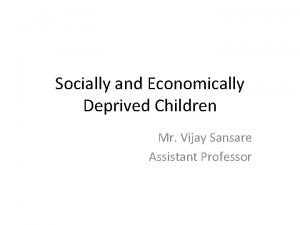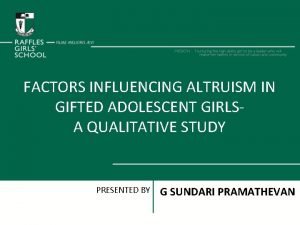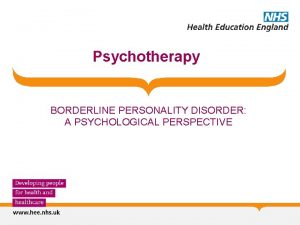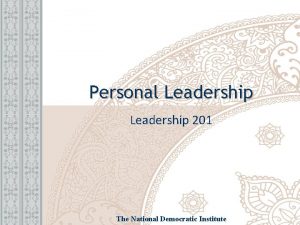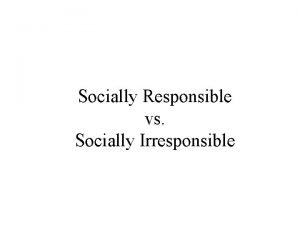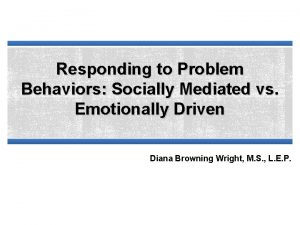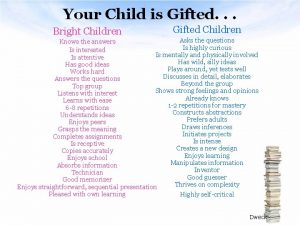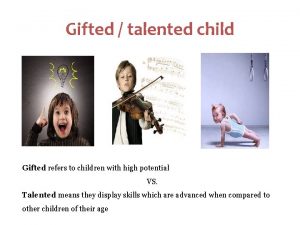Raising the Socially and Emotionally Competent Gifted Child












- Slides: 12

Raising the Socially and Emotionally Competent Gifted Child

As a parent of a gifted child, I wanted my daughter to……. üTake advantage of her gift üBe the best that she can be üExcel at academics

• Our daughter was identified as gifted in the 3 rd grade at Sunnyside Elementary school • Took AP class at Bonita Middle • Was in the International Baccalaureate program at Bonita Vista High School • Attended Cal Poly San Luis Obispo and received her degree in engineering

But what about her social and emotional growth? • What I know today is that most people don’t get fired from their job because they can’t do the work. They get fired because they can’t get along with the co-workers or boss. • Superior intelligence does not guarantee a happy and successful life

Emotional Intensity • Gifted kids often struggle with emotional intensity and perfectionism. They fear failure and react in unusually intense ways when they don’t get their way or are disappointed. • Sometimes perfectionism can be paralyzing to a gifted child, keeping them from trying something new for fear of failing at it. • Gifted children may hold back in situations, waiting to assess all implications before acting, which can make them seem socially inept or shy. • Intensity can manifest itself in extreme outbursts towards others — especially in situations that do not normally warrant strong reactions. • Extreme sensitivity can cause intense kids to take things too personally.

Perfectionism In a positive form, perfectionism can provide the driving energy which leads to great achievement. The meticulous attention to detail necessary for scientific investigation, the commitment which pushes composers to keep working until the music realizes the glorious sounds playing in the imagination, and the persistence which keeps great artists at their easels until their creation matches their conception all result from perfectionism. Setting high standards is not in itself a bad thing. However, perfectionism coupled with a punishing attitude towards one's own efforts can cripple the imagination, kill the spirit, and so handicap performance that an individual may never fulfill the promise of early talent.

• The inner drive to be perfect, leads many gifted children to perceive themselves as failures even when external evidence indicates high level success. It is in the child's reaction to this perceived failure that the danger lies.

Adult Expectations • The perfectionism of gifted children is frequently exaggerated by adults who constantly urge them to live up to their potential. Parents may overschedule their child with lessons and worthwhile activities, leaving no time to daydream or to play with ordinary toys. Teachers who observe the spark of high-level talent pile on extra work, and never seem satisfied

Praise effort and outcome • Offering specific feedback on a gifted child's work, rather than “you are reading two grade levels higher than anyone in your class”. It is better to direct the child's attention toward strategies for improvement without regard for failure or success.

Social Interaction • Children who withdraw early from social interaction may deprive themselves of the opportunity to learn needed social interaction skills. • Developing friends with many interests…. Our daughter wanted to dance and run track

Nurturing Your Own Social and Emotional well -being To provide optimal care for our children, we must also attend to our own needs. We need to ensure that we are nurturing and respecting ourselves. Parenting can be incredibly rewarding, yet it can also be continually exhausting and demanding

Things to consider as a parent of a gifted child: 1. Work through frustrations and meltdowns once they have calmed down 2. Model gracious losing 3. Allow your child to fail and model how you handle those situations 4. Allow your child to experience everyday childhood activities 5. Praise effort 6. Remember you are the model that teaches your child how to behave and react
 Raising a godly child in an ungodly world
Raising a godly child in an ungodly world Socially deprived child meaning
Socially deprived child meaning Gifted child anger problems
Gifted child anger problems Definition of gifted child
Definition of gifted child Conclusion of gifted child
Conclusion of gifted child Factors influencing altruism
Factors influencing altruism Every child is gifted they just unwrap
Every child is gifted they just unwrap Emotionally unstable personality disorder
Emotionally unstable personality disorder How to take care of yourself emotionally
How to take care of yourself emotionally Bandwagon examples propaganda
Bandwagon examples propaganda Evocative responding
Evocative responding Emotionally disturbed
Emotionally disturbed Emotionally charged words
Emotionally charged words

